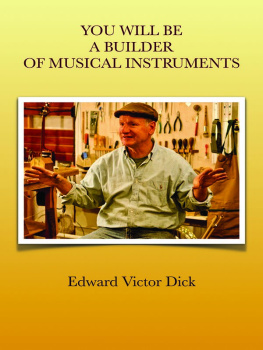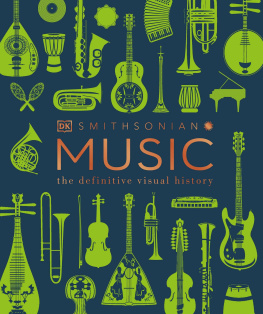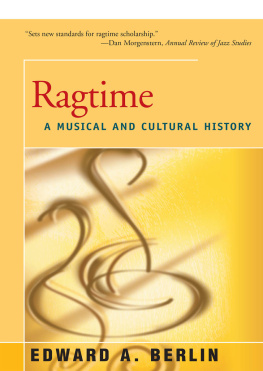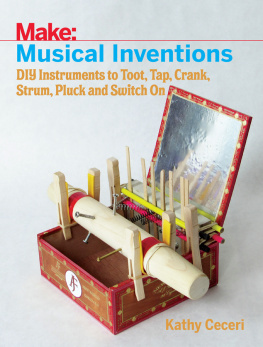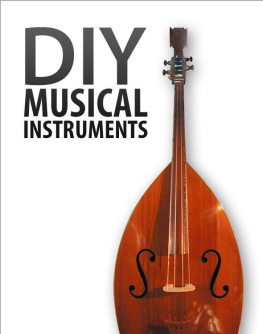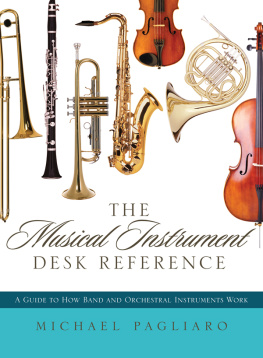Table of Contents
All rights reserved. No part of this publication may be reproduced, distributed, or transmitted in any form or by any means, including photocopying, recording, or other electronic or mechanical methods, without the prior written permission of the publisher, except in the case of brief quotations embodied in critical reviews and certain other noncommercial uses permitted by copyright law.
ISBN: 978-1-6678627-6-7
Contents
Acknowledgements
Thanks to Vanessa for putting up with my shenanigans for the past 33 years, for helping me feel loved, and for making me cookies.
Thanks to brothers Ern and Ken, both authors of note, for their encouragement and advice in writing this.
Thanks to Tom Lell and Carolyn Turner for fixing my boo-boos and for puttin some spit and polish on this collection of words.
Thanks to Kathie for helping raise our wondrous daughter and to Hannah for being the wise and flexible person she is.
Thanks the the many, many musicians who entrusted me with their prized possessions and who helped me put food on the table. And especially those who commissioned me to build them instruments.
Thanks to Douglas, Don, Brian, Peter, Bob, Micah, Greg, Kelley, Art, John, Tom, Heath, and Andrew for following my strict direction (most of the time) and for listening to my many musings while getting the work done.
And finally thanks to Heath, Tom, and Andrew for carrying on with the vocation that has been so precious to me.
www.banjolas.com
www.victorguitar.com
Intro
In re-reading this the first thing that comes to mind is just how damn lucky I have been. I remember one time as a child, after scoring three goals in a hockey game, the coach exclaiming,
Youve got horse-shoes up your ass!
It was true. There were others who were much more talented hockey players than I. But somehow I frequently managed to be in the right place at the right time to have the puck deflect off my stick for the winning goal.
The same has been true in my career. I was not particularly talented in music. I avoided business whenever I could. I had very little training in craftsmanship and woodworking.
And yet somehow, I managed to carve out a career for myself as a luthier.
I imagine that to many my life appears topsy turvy and convoluted. It was not without its moments of confusion, believe me. But, like any journey, each step was somehow necessary and every choice made perfect sense.
As my younger brother, wise beyond his years, once said, You live your life forward, but you understand it backward.
Before the Beginning
This is the tale of my life as a luthier. It is not my complete life story by any means, but it is the account of my work and my passion and the vocation that some would say I have been obsessed with for the past 50 years.
Nor is the tale over yet.
But I do want to scribble down some of these stories before they get lost in the sawdust, swept up, and recycled with the rest of humanity.
First I need to provide some contextsome background about who I am and how I came to be.
I grew up the middle child in a family of seven in a small town called Leamington at the very southern tip of Ontario, Canada. Same latitude as northern Californiahandy info if you are in a geography trivia quiz.
We had a small farm where we grew peaches, potatoes, asparagus, corn, cabbage, cauliflower, green beans, tobacco and tons of tomatoes. Leamington is known as the tomato capital of Canada and the home of Heinz Ketchup. There was even a monument of a giant tomato smack dab in the center of town.
Everyone was expected to help on the farm and so I was working at a very early age. One of my earliest memories is walking alongside my mother in the asparagus field at age two or three, carefully cutting spears of asparagus with a very sharp paring knife and placing them in her basket.
I loved tools, learning new things, and working on the farm. My parents were very good at turning tedious tasks into games counting how many baskets of peaches we could pick or bags of potatoes we could harvest in a single day. I was encouraged to continuously work harder, and be more efficient in my movements.
I mention this because later in my career it turned out to be a very useful habit.
Dad also employed a very clever strategy of rewarding good work results with ever increasing degrees of responsibility. I remember how proud I felt when I was finally allowed to go off on a tractor all on my own to till the land.
The work was arduous and dirty and I grumbled a lot, but secretly I enjoyed most of it.
I loved playing any and all sports and was reasonably adept at most things. I spent a good deal of my youth believing I would grow up to be a professional hockey player.
As a hockey player in 1959 and 1969
I learned to trust in my instinct when trying to accomplish things. I took risks easily and often, made many mistakes and had numerous injuries, but always seemed to recover quickly. I was good at doing things I liked and reasonably clever at avoiding those I didnt.
As a child it was often suggested that I had an over-active imagination. I couldnt (and still dont) understand why people didnt use their imagination to create the world they wanted instead of the one they were presented with.
There was a little country airport a mile away. I would frequently find myself staring at the sky watching airplanes take off and land, and creating stories about where they were going or where they had been. Imagining myself flying off into the unknown someday.
We were Mennonites and so my family went to church a lot, didnt drink, didnt dance, and spent a good amount of energy in a sincere effort to be righteous. It was a good wholesome life but one I sometimes found boring. I seemed compelled to do what I could to disrupt thingsif for no other reason than to make things more interestingand of course much to the chagrin of my parents.
School was a bit of a mixed bag for me. I had frequent conflicts with my teachers and issues with authority in general. Homework was not my thingif I didnt have farm work to do when I got home, I wanted to play. While in the classroom I would typically do homework for one subject while pretending to listen to another. This worked out pretty well until the 9th or 10th grade when I gave up on homework entirely. My arrogant (and perhaps correct) belief was that if you couldnt learn it in class, it wasnt worth remembering.
I attended a Mennonite private high school at the unequivocal insistence of my parents. My father had not been allowed to go to high school himself he was needed on the family farmand so naturally he was very keen on education and went on to become chairman of the school board.
But this was the 1960s, the age of social change and rebellious youth. I aspired to be a hippie. This didnt at all mix well with my austere Mennonite environment and in the end it proved to be a great motivator for me to me to leave home sooner rather than later.
This is about my life as a luthier, however, and so perhaps I should talk about music in my childhood.

